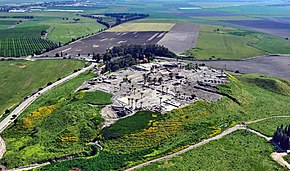Tel Megiddo
| מגידו | |

Aerial view of Tel Megiddo
|
|
| Location | Near Kibbutz Megiddo, Israel |
|---|---|
| Region | Levant |
| Coordinates | 32°35′4.64″N 35°11′0.58″E / 32.5846222°N 35.1834944°ECoordinates: 32°35′4.64″N 35°11′0.58″E / 32.5846222°N 35.1834944°E |
| Type | Settlement |
| History | |
| Founded | c. 7000 BCE |
| Abandoned | 586 BCE |
| Official name | Biblical Tells – Megiddo, Hazor, Beer Sheba |
| Type | Cultural |
| Criteria | ii, iii, iv, vi |
| Designated | 2005 (29th session) |
| Reference no. | 1108 |
| State Party | Israel |
| Region | Asia-Pacific |
Megiddo (Hebrew: מגידו; Arabic: مجیدو, Tell al-Mutesellim, "The Tell of the Governor") is an ancient city whose remains form a tell (archaeological mound), situated in northern Israel near Kibbutz Megiddo, about 30 km south-east of Haifa. Megiddo is known for its historical, geographical, and theological importance, especially under its Greek name Armageddon. During the Bronze Age, Megiddo was an important Canaanite city-state and during the Iron Age, a royal city in the Kingdom of Israel. Excavations have unearthed 26 layers of ruins, indicating a long period of settlement. Megiddo is strategically located at the head of a pass through the Carmel Ridge overlooking the Jezreel Valley from the west. Evangelical Christians believe it will be the site of the final battle between Jesus Christ and Satan, as outlined in the Book of Revelation. The site is now protected as Megiddo National Park and is a World Heritage Site.
Megiddo is also known as Greek: Μεγιδδώ/Μαγεδδών, Megiddó/Mageddón in the Septuagint; Latin: Mageddo; Assyrian: Magiddu, Magaddu; Magidda and Makida in the Amarna tablets; Egyptian: Maketi, Makitu, and Makedo. The Book of Revelation mentions an apocalyptic battle at Armageddon, a Greek name of the site, derived from the Hebrew "Har Megiddo", meaning "Mount of Megiddo". "Armageddon" has become a byword for the end of the world.
...
Wikipedia

